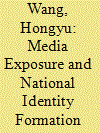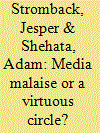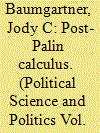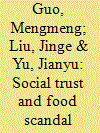|
|
|
Sort Order |
|
|
|
Items / Page
|
|
|
|
|
|
|
| Srl | Item |
| 1 |
ID:
150342


|
|
|
|
|
| Summary/Abstract |
allowance (EUA) prices and volatility. Reductions in price and increases in volatility are observed when EP decisions are (i) not “party-political” in origin, (ii) made during times of low market sentiment, or (iii) made during times of low market attention. Daily EUA prices from 2007 to 2014 are used in the study, with decisions analysed using an event study approach for price impact, and a GARCH specification for volatility impact. Our findings suggest the need for policymakers to improve communication of long-term strategies for the EUA market. This aims to reduce the evident ongoing uncertainty experienced by traders around each decision made by the EP. The finding that sentiment and market attention at the time of an EP decision influences the market's reaction indicates a need to consider market dynamics in terms of decision timing, so that market turbulence is not an unintended by-product of an EP decision. Some form of medium term forward guidance may be called for.
|
|
|
|
|
|
|
|
|
|
|
|
|
|
|
|
| 2 |
ID:
160113


|
|
|
|
|
| Summary/Abstract |
Using survey method, this study compares the relative importance of exposure to Chinese media, pro-China local media, pro-democracy local media, and new media (e.g., Weibo, Facebook) on the building of national identity among Macau college students. We argue that the effect of media exposure on national identity formation is not uniform, owing to the political leanings of the media and the platform on which the information is transmitted (new media vs. traditional media). We find that getting news about China on Facebook is the most important predictor of the formation of national identity among college youth in Macau, followed by getting news on Weibo and exposure to traditional Chinese media. Conversely, exposure to pro-democracy local media and frequent use of Facebook exert a negative effect on national identity building among college youth in Macau. Positive sentiment toward China and trust in the central government act as mediators and fully explain the relationship between exposure to traditional pro-China media and national identity but cannot explain the positive effect of exposure to new media on national identity formation.
|
|
|
|
|
|
|
|
|
|
|
|
|
|
|
|
| 3 |
ID:
098159


|
|
|
|
|
| Publication |
2010.
|
| Summary/Abstract |
Being politically interested is one of the most important norms from a democratic perspective, as it is a crucial antecedent for voting, political knowledge, civic and political participation, and attentiveness to political information. However, only limited research has focused on the relationship between media use and political interest, despite the notion that modern politics is mediated politics. Even more important is the fact that the causal relationship between media use and political interest still has not been firmly established. Against this background, the purpose of this study is to investigate the causal relationship between news media use and political interest. The results show that there are indeed causal and reciprocal relationships between political interest and attention to political news, and between political interest and exposure to some, but not all, news media. Overall these results lend stronger support to the perspective of media mobilisation theories than media malaise theories.
|
|
|
|
|
|
|
|
|
|
|
|
|
|
|
|
| 4 |
ID:
116452


|
|
|
|
|
| Publication |
2012.
|
| Summary/Abstract |
In this article results are presented from a conditional logit model of vice presidential selection that correctly predicts Mitt Romney selecting Paul Ryan as his vice presidential running mate in 2012. The model, which correctly predicts 14 of the 20 contested major party vice presidential nominations from 1960 through 2008, suggests that media exposure, political experience, having served in the military, age, and gender/racial/ethnic diversity are significant factors in selecting a vice presidential candidate in the modern era.
|
|
|
|
|
|
|
|
|
|
|
|
|
|
|
|
| 5 |
ID:
182804


|
|
|
|
|
| Summary/Abstract |
Food safety problems are drawing increasing attention after the occurrence of repeated food scandals in China. The literature has found that social trust, a non-institutional factor, is an important factor in disciplining dishonest behaviour and improves the media's incentives to report. In this paper, we develop a model to investigate the dual effects of social trust—behaviour discipline effect and media enhancing effect—and analyse its interplay with institutional factors on food scandal exposure. The theory is then tested using 2004–2011 food event data. The results show that trust has a significant positive impact on food scandal exposure, which implies that the media enhancing effect plays a dominant role in China. However, this effect is weakened in provinces with a higher level of law enforcement and market development, which suggests that institutional factors are a substitute for social trust in affecting food scandal exposure in China.
|
|
|
|
|
|
|
|
|
|
|
|
|
|
|
|
|
|
|
|
|